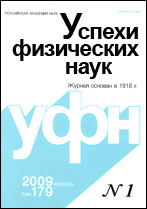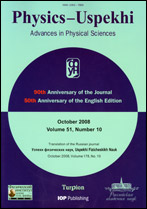|
This article is cited in 54 scientific papers (total in 54 papers)
REVIEWS OF TOPICAL PROBLEMS
Nonlinear effects in macroscopic kinetics
A. G. Merzhanov, E. N. Rumanov
Chernogolovka Institute of Chemical Physics of the USSR Academy of Sciences
Abstract:
Macroscopic kinetics describes relaxation in terms of macroscopic states, i.e., the distributions of density, temperature, and so on. Two types of system are examined in this review, namely, (1) closed systems (or systems interacting exclusively with a thermostat) and (2) flow systems in which the nonequilibrium state is maintained by an external agency (source of supply or pump). In both cases, states are established that do not depend (in a particular range) on the initial conditions. These are the attractor states. Spatially homogeneous states (kinetic phases) are discussed for flow systems, together with transitions between them that are the analogs of the motion of interphase boundaries. In closed systems, the establishment of equilibrium can be preceded by the appearance of other attractors in the form of intermediate asymptotic behavior. A comparison is made between similar states in different processes (chemical reactions, viscous flows, absorption of light, and so on). Stability conditions are discussed.
Citation:
A. G. Merzhanov, E. N. Rumanov, “Nonlinear effects in macroscopic kinetics”, UFN, 151:4 (1987), 553–593; Phys. Usp., 30:4 (1987), 293–316
Linking options:
https://www.mathnet.ru/eng/ufn7924 https://www.mathnet.ru/eng/ufn/v151/i4/p553
|


| Statistics & downloads: |
| Abstract page: | 69 | | Full-text PDF : | 25 |
|





 Contact us:
Contact us: Terms of Use
Terms of Use
 Registration to the website
Registration to the website Logotypes
Logotypes







 Citation in format
Citation in format 
